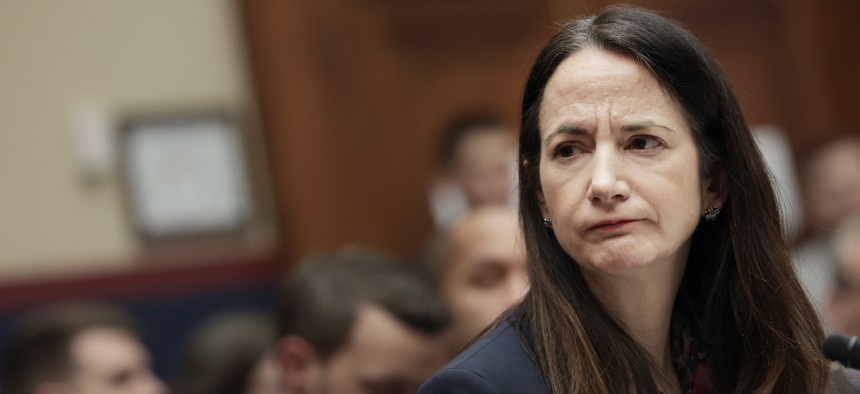
Director of National Intelligence Avril Haines listens during a House Intelligence Committee hearing March 8, 2022. Getty Images / Anna Moneymaker
Concern Rising That Putin Could Use Nuclear Weapons
Russian “escalate to de-escalate” doctrine suggests Putin is thinking the unthinkable.
The world should take Russia’s escalating nuclear threats very seriously, senior intelligence officials told lawmakers Tuesday, while noting that they have not yet seen clear indications that Russian leader Vladimir Putin would respond to military setbacks in Ukraine with nukes.
Putin sparked alarm among nuclear watchers last month when he ordered the country’s nuclear forces be put on a “special regime of combat duty.” Speaking to lawmakers on Tuesday, Avril Haines, the director of Office of the Director for National Intelligence, said that move was mostly “signaling” to keep NATO from intervening in Ukraine.
“He is effectively signaling that he's attempting to deter and that he has done that in other ways. For example, having the strategic nuclear forces exercise that we indicated had been postponed until February, again, then as a method of effectively deterring,” Haines said.
It’s not the first time Russian officials have said NATO activity in Ukraine could prompt them to use nuclear weapons. In 2017, Russian parliamentarian Vyacheslav Nikonov made a similar statement. But Haines and others told U.S. lawmakers that as the Russian invasion stalls, the threat of nuclear use is rising.
At the hearing, CIA director William Burns said the Russian military doctrine contemplates the use of smaller tactical nuclear weapons.
“You know, Russian doctrine holds that you escalate to de-escalate, and so I think the risk would rise, according to the doctrine,” Burns said.
Army Lt. Gen. Scott Berrier, the head of the Defense Intelligence Agency, told lawmakers that Putin may think such weapons give him an asymmetric advantage.
“I also believe that when he says something, we should listen very, very carefully and maybe take him at his word. So this question is the one that analysts are pondering right now, and I think we really do some more work on it,” Berrier said.
A former senior White House official familiar with Russian nuclear security issues told Defense One that the risk of a Russian first nuclear use is rising, largely because Putin doesn’t view such weapons in the same way as the United States, or even the former Soviet Union.
“The [United States] has newer weapons to deter conventional conflict…Russia has nuclear weapons as part of a warfighting battle plan,” said the official, who called them just a “warfighting tool” for Russia. The former official said the danger is increasing “precisely because the conflict in Ukraine is going badly.”
The official outlined a scenario in which Putin consolidates some gains in southern Ukraine but fails to install a new puppet regime.
“Ukrainians may or may not cease and desist. The West may or may not continue to arm the Ukrainian insurgency and [Putin] might decide, ‘OK. I'm going to set off a bomb somewhere in western Ukraine to send a message that I have crossed the nuclear threshold, and you can follow me if you want.”







